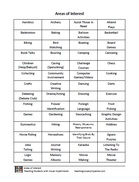- Home
-
VI Basics
-
Eligibility
- VI Referrals >
- Medical Vision Exam >
- Visual Diagnosis >
-
FVLMA
>
- FVLMA & Service Printables
- Conducting a FVLMA
- What is the FVLMA
- Environmental Observations
- Student Observations
- Interviews
- Assessment Kit Materials
- Oculomotor Skills
- Near Visual Acuities
- Print Comparisons
- Distance Acuity
- Test Visual Fields
- Vision Skills
- Learning Media Assessment
- Reading Rates
- Writing the FVE Report
- Other Evaluations >
-
Service
- ECC Annual Needs
- Service Plans >
- Goals & Objectives >
-
Adaptations
>
- Accommodations & Modifications
- School Campus Adaptations
- Playground Adaptations
- Movies & Assemblies
- Classroom Design Tips
- Adjust Lighting
- Label Classroom
- Board Work (Chalk, Interactive, White)
- Morning Meeting
- Lectures & Instruction
- Accessible Educational Materials
- Photocopying
- Font Legibility
- Increase Contrast
- Pictures and Worksheets
- Large Print
- Accommodations for VI
- Accessible Content for BLVI
- Collaboration >
-
Instruction
>
- Material Preparation
- Virtual Instruction
- Development of ECC Resources
- Teaching the ECC
- Teaching in Thematic Units
- Instructional Strategies
- iPads as Instructional Tools
- Standard Course of Study Strategies & Activities
- The Art of Teaching the ECC
- Activities to Teach the ECC
- Virtual & F2F Strategies
- Found of Teaching the ECC in the Age of Virtual Instruction
- Complete Set Bonus >
-
Themes
>
- Using Themes to Teach the ECC
- Back to School
- Birthday's and Aging
- Self & Identity
- Pets & Service Animals
- Family & Geneology
- Apples & Orchard
- Autumn & Home Maintenance
- Pumpkins & Farms
- Costumes & Candy
- Politics & Voting
- Grocery Stores
- Meal Preparation & Thankfulness
- Shopping & Clothing Care
- Christmas & Gift Giving
- Clocks, Time, New Year
- Resolutions & Healthy Habits
- Wintertime
- Cold & Flu Season
- Adapted Sports & Paralympics
- Valentines Love & Friendship
- Severe Weather Unit
- Stay Safe
- Home & Spring Cleaning
- Springtime & Easter
- Gardening
- Communication & Post Office
- Hygiene & Grooming Unit
- Transportation
- Jobs & Employment
- Graduation & Life Changes
- The Great Outdoors
- Vacations & Travel
-
ECC
-
Compensatory
>
-
VI Assistive Tech
>
- VI AT Printables
- Selecting the Right AT
- Overview of Assistive Technology
- Low/Medium Tech Devices for Tactual Learners
- Non-Optical Low Vision Devices
- Optical Devices for Near
- Optical Devices for Distance
- Making the iOS Device Accessible
- VoiceOver
- iOS Accessibility Resources
- Screen Magnifiers & Readers
- Magnifier Apps
- Keyboarding Instruction
- Word Processing and Shortcuts
- Navigate Computer without a Mouse
- Video Magnifiers
- Video Magnifier Instruction
- Braille Technology
- Notetaker Instruction
- Auditory Access Devices
- Accessing Audio Books
- Apps to Access Books
- Apps for VI
- VI AT Resources
- Social Skills >
- Self Determination
-
Sensory Efficiency
>
-
Independent Living
>
- Responsibility & Independence
- General Home Safety
- Bathroom Adaptations
- Hygiene & Grooming
- Medication Adaptations
- Dramatic Play
- Dressing & Clothing Identification
- Clothing Management
- Housekeeping Maintenance
- Eating Adaptations
- Mealtime Independence
- Kitchen Adaptations
- Food Preparation
- Recipe Activities
- Money
- Orientation & Mobility >
- Recreation & Leisure >
- Career & Vocational >
-
Compensatory
>
- VI Store
- Jobs
Recreation & LeisureBy: Carmen Willings
teachingvisuallyimpaired.com Updated June 9, 2019 Recreation and leisure skills may include traditional as well as adapted physical education activities. However, as with social interaction skills visually impaired students need help identifying the array of choices available to them in this area and must be taught how to perform leisure skills that most students learn through observation.

Each person will have their own interests and preferences, but it is important to help a student discover a lifelong leisure activity. Examples of activities include arts/crafts, reading, culture, fitness, outdoor & community activities. Each student should be encouraged to participate in recreational activities with their peers. The student should be encouraged to: choose an object to play with or an activity when presented with options; play simple card, board and table games; identify various community activities and facilities; participate in clubs/activities; identify and choose appropriate leisure activities and hobbies; play age-appropriate games enjoyed by peers; and cooperate in team activities.
PlayPlay is the foundation for learning about the world. Through play, children learn to make comparisons between materials and develop preferences. Children learn many skills through play and also begin to develop social skills. Play is an important part of the Early Childhood curriculum, but children may need to continue to develop their play skills even as they elementary school. Additionally, students may need to learn how to play.
PlaygroundThe playground should be adapted for the student with visual impairments. It is important for a student to be oriented to a playground when it is quiet and when other students are not on the playground. In addition to learning where the equipment is located, students should have the opportunity to tactually explore the equipment to learn how it moves. The student should also be instructed to visually scan the playground and/or use auditory cues prior to moving from one area to another.
LeisureAll children will naturally gravitate toward a preferred activity. O course, students should be permitted to develop in their area of interest, but it is important to expose children to a wide variety of leisure activities to ensure the students are aware of a variety of leisure activities available. Students who are blind or visually impaired do not have the same opportunity to visually observe a variety of activities available. Factors such as cost and material adaptations will play a factor in what activities are accessible. Also, students may need to learn skills needed to participate in the activity.
BowlingStudents can learn basic bowling skills by playing with home-made or purchased bowling sets that can be used at home and school. A sound source can be placed behind the pins in order to provide an auditory target for the students. Many bowling alleys will provide bumpers, or portable bowling rails, upon request.
Cultural ActivitiesTake advantage of programs at local museums and galleries. Prior to planning a field trip or visit, call the museum to discuss the possibility of making the experience accessible or if they can arrange for hands-on experience. They may offer audio recordings or have a special tour. Some museums provide programs in braille. Some theaters offer headsets that provide audio descriptions.
Word, Card & Board GamesPlaying games is a lifelong leisure time activity that fosters social interactions. In order to be accessible to a student with a visual impairment, they may need to be adapted. Although someone knowledgeable in braille, can adapt card and board games, there are commercially available games that have been adapted with braille as well as large print. Large print cards can be purchased or made for students with low vision. Some games are available in an accessible format.
BicyclingThe foundation for bicycling can begin when a child is young. Providing opportunities for students to play on riding toys is a good introduction. Older students can build endurance and experience physical activity by using a stationary bike. Students with low vision may be able to learn to ride a bike, but depending on their level of available vision, may need to ride alongside a sighted adult or peer who can warn the student of any dangers. Students who are blind may be able to experience biking using a tandem bicycle.
Physical Games & SportsSimple games can be adapted easily, but it may be more challenging to adapt team sports. Although games can be adapted, students will need to acquire the motor skills necessary to fully participate in the games. Skills needed to play in games may need to be taught in isolation. It is important to be aware of the student's are more at risk for retinal detachment. Also, some eye conditions can be aggravated by vigorous physical activity. The student should either refrain from the activity or it should be modified.
Embedded Learning Opportunities There are many opportunities throughout the day to embed skills. Gross motor play (such as at recess and gym time) is a great opportunity to incorporate concepts, language, listening and obviously motor skills. Concepts such as over/under, on top of/underneath, wide/narrow, fast/slow are easily incorporated. Provide experiences that focus on the auditory discrimination of people’s voices and sounds related to activities. Encourage listening and the use of auditory clues to locate people or places. Play listening games such as Simon Says. Listen to and follow directions when participating in a game (begin with simple one-step directions and progress to more difficult two-step directions).
Practice different ways to cross the gym/playground: walking, tiptoe walking, galloping, skipping, hopping, running with a partner, jumping. Make it a game of walking up and down stairs in a “Teacher May I” game. Practice jumping up and down with jump rope or Chinese jump rope games. Practice keeping balance while walking along curbs or balance beam. Play games that incorporate throwing and catching balls. Encourage the student to slide, climb on play structures, crawl through tunnels, and play on swings. Encourage students to create their own obstacle courses and challenge their friends Students are able to use recess and gym time to gain an understanding of their bodies in space; improve their physical skills; develop language and concept development, and practice group cooperation. Many of the team games and athletics are excellent and appropriate for students with visual impairments. In addition, however, these students need to develop activities in recreation that they can enjoy throughout their adult lives. Most often sighted persons select their recreation activity repertoire by visually observing activities and choosing those in which they wish to participate. Learn to PlayStudents with visual impairments need will often need extra help in exploring new toys and materials. This page provides suggestions for introducing toys.
AudioGamesThis is a community portal for all things to do with audio games. It features news, articles, a forum and a database of over 500 titles on platforms from Microsoft Windows to iOS.
Audio Game HubAudio Game Hub is a set of 13 arcade games that use audio as their primary interface, making them accessible for both sighted and non-sighted users.
ObjectiveEd's Blindfold GamesObjectiveEd provides games related to the Expanded Core Curriculum for pre-K to 12th grade students. They currently offer a suite of over 80 Blindfold Games. Blindfold Games is a series of audio games for persons who are visually impaired that are designed for use on an iPhone, iPad and iPod.
VI Sports AssociationsThere are a number of great web resources and organizations that provide information and resources specific to persons who are blind or visually impaired. This page provides information on VI sports associations.
|
Recreation & Leisure Skills
|
|
Teaching Students with Visual Impairments LLC
All Rights Reserved |
- Home
-
VI Basics
-
Eligibility
- VI Referrals >
- Medical Vision Exam >
- Visual Diagnosis >
-
FVLMA
>
- FVLMA & Service Printables
- Conducting a FVLMA
- What is the FVLMA
- Environmental Observations
- Student Observations
- Interviews
- Assessment Kit Materials
- Oculomotor Skills
- Near Visual Acuities
- Print Comparisons
- Distance Acuity
- Test Visual Fields
- Vision Skills
- Learning Media Assessment
- Reading Rates
- Writing the FVE Report
- Other Evaluations >
-
Service
- ECC Annual Needs
- Service Plans >
- Goals & Objectives >
-
Adaptations
>
- Accommodations & Modifications
- School Campus Adaptations
- Playground Adaptations
- Movies & Assemblies
- Classroom Design Tips
- Adjust Lighting
- Label Classroom
- Board Work (Chalk, Interactive, White)
- Morning Meeting
- Lectures & Instruction
- Accessible Educational Materials
- Photocopying
- Font Legibility
- Increase Contrast
- Pictures and Worksheets
- Large Print
- Accommodations for VI
- Accessible Content for BLVI
- Collaboration >
-
Instruction
>
- Material Preparation
- Virtual Instruction
- Development of ECC Resources
- Teaching the ECC
- Teaching in Thematic Units
- Instructional Strategies
- iPads as Instructional Tools
- Standard Course of Study Strategies & Activities
- The Art of Teaching the ECC
- Activities to Teach the ECC
- Virtual & F2F Strategies
- Found of Teaching the ECC in the Age of Virtual Instruction
- Complete Set Bonus >
-
Themes
>
- Using Themes to Teach the ECC
- Back to School
- Birthday's and Aging
- Self & Identity
- Pets & Service Animals
- Family & Geneology
- Apples & Orchard
- Autumn & Home Maintenance
- Pumpkins & Farms
- Costumes & Candy
- Politics & Voting
- Grocery Stores
- Meal Preparation & Thankfulness
- Shopping & Clothing Care
- Christmas & Gift Giving
- Clocks, Time, New Year
- Resolutions & Healthy Habits
- Wintertime
- Cold & Flu Season
- Adapted Sports & Paralympics
- Valentines Love & Friendship
- Severe Weather Unit
- Stay Safe
- Home & Spring Cleaning
- Springtime & Easter
- Gardening
- Communication & Post Office
- Hygiene & Grooming Unit
- Transportation
- Jobs & Employment
- Graduation & Life Changes
- The Great Outdoors
- Vacations & Travel
-
ECC
-
Compensatory
>
-
VI Assistive Tech
>
- VI AT Printables
- Selecting the Right AT
- Overview of Assistive Technology
- Low/Medium Tech Devices for Tactual Learners
- Non-Optical Low Vision Devices
- Optical Devices for Near
- Optical Devices for Distance
- Making the iOS Device Accessible
- VoiceOver
- iOS Accessibility Resources
- Screen Magnifiers & Readers
- Magnifier Apps
- Keyboarding Instruction
- Word Processing and Shortcuts
- Navigate Computer without a Mouse
- Video Magnifiers
- Video Magnifier Instruction
- Braille Technology
- Notetaker Instruction
- Auditory Access Devices
- Accessing Audio Books
- Apps to Access Books
- Apps for VI
- VI AT Resources
- Social Skills >
- Self Determination
-
Sensory Efficiency
>
-
Independent Living
>
- Responsibility & Independence
- General Home Safety
- Bathroom Adaptations
- Hygiene & Grooming
- Medication Adaptations
- Dramatic Play
- Dressing & Clothing Identification
- Clothing Management
- Housekeeping Maintenance
- Eating Adaptations
- Mealtime Independence
- Kitchen Adaptations
- Food Preparation
- Recipe Activities
- Money
- Orientation & Mobility >
- Recreation & Leisure >
- Career & Vocational >
-
Compensatory
>
- VI Store
- Jobs

